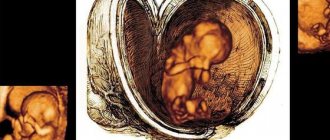Interesting Facts
| Options | Indications |
| Time from conception | 6 weeks |
| Period by month | 8 weeks |
| What month | 2 |
| Dimensions and weight of the fetus | 14–20 mm, 3 g |
| Uterus dimensions | Like a duck's egg or a woman's fist |
| Pregnant weight | -/+ 1.5-2 kg from the original |
Your baby is the size of
grape berry
14–20 mm Size
3 g Weight
You are eight weeks pregnant. What happens to the unborn baby and mother during this period? Let's find out about this, but first let's decide on the calculations:
- 8 weeks is how many months? You are in the first trimester of pregnancy, you are 2 months pregnant. You are still at the beginning of your journey, but very soon those around you will begin to guess about your situation.
- From conception or menstruation? Our calendar was created in accordance with the obstetric method of counting, when the first day of the last menstruation is considered the beginning of pregnancy. 8 weeks from conception corresponds to 10 weeks of obstetric period.
How a woman’s body changes by the 8th week of pregnancy
At this stage, the expectant mother’s breasts have already enlarged; under the influence of the hormone prolactin, the glands responsible for the production of mother’s milk begin to grow. From the 8th week, the cervix softens, and the mucous membrane of the cervical canal produces cervical secretion. The mucus accumulates and becomes thick, forming a plug and blocking the path of any infection from the vagina, thereby protecting the growing fetus. By the way, the removal of a plug from the cervical canal is one of the harbingers of impending childbirth.
What happens to mom: sensations at the eighth week
People around you may not yet know about your situation, but for you the signs of pregnancy are becoming more and more vivid. Most likely, you regularly suffer from nausea in the morning and react sharply to certain smells and tastes. Toxicosis will pass in the second trimester, which is getting less and less time. Be patient and have some crackers.
Among other common symptoms at 8 weeks of pregnancy, we note:
- frequent urination - occurs due to the pressure that the growing uterus puts on the bladder;
- breast tenderness is a reaction to the preparation of the mammary gland for breastfeeding;
- swelling of the arms, legs, face - appears due to additional stress on the urinary system;
- an increase in body temperature to 37-37.5 ° C, not associated with a cold, but due to hormonal changes and increased blood flow during pregnancy;
- discomfort in the lower back - observed due to compression of the nerve endings by the growing uterus. Massage and changing body position will help. If you not only have lower back pain, but also have spotting, consult a doctor immediately: it may be a miscarriage.
Many pregnant women at 8 weeks complain of cramps and pain in the abdomen. If pain occurs periodically, is quite tolerable in strength and goes away on its own, then there is no need to worry - it is caused by stretching of the ligaments and tissues of the uterus. If your stomach feels sharp and unbearable, you should seek emergency help to prevent miscarriage.
Fever and colds
The high rate of metabolic processes at this stage of the gestational period causes a slight increase in temperature to +37.1+37.2°C. An excessive increase in body temperature may indicate that there is an inflammatory process in the body and additional examination is necessary.
Long-term hyperthermia threatens the health of the fetus, which may develop developmental defects. Possible fading of pregnancy, threat of miscarriage. Reducing the temperature is carried out after consulting a doctor on the use of antipyretic drugs. It is quite possible that he will suggest getting by with rubdowns and cool compresses.
ARVI and acute respiratory infections at the 8th week of pregnancy can lead to serious consequences - pathologies of the placenta, fetal hypoxia, and spontaneous abortion. To avoid getting sick during the season of increased risk of infection, you should limit contact with sick people, avoid attending public events, and dress according to the weather.
Treatment of colds is carried out after consulting a doctor, using a minimum of medications.
Main methods of treatment:
- compliance with bed rest;
- plenty of warm drinks (tea with honey, milk with butter, decoction of mint, linden flowers);
- rinsing the nose with sea water;
- gargling with decoctions of calendula, chamomile, and soda solution.
What does an 8 week embryo look like?
The size of the unborn child is comparable to the size of a bean or grape. It contains 14–20 mm and 3 grams. From the 8th week it is no longer an embryo, but a fetus, that is, it already contains all the main systems and organs. The heart has four chambers and valves continue to form. Heart rate – 150-170 beats per minute.
The reproductive system is developing: the boy has already formed testicles, the girl has ovaries. But during an ultrasound in the eighth week of pregnancy, you are unlikely to be told the sex of the unborn child due to the high probability of error.
But the contours of the upper and lower jaws, ears, nose, and eyelids are already clearly visible. Knee and elbow joints, fingers and toes are formed, still connected by a skin membrane. The baby can already move them and also turn his head to the side, but such movements are still elusive to the mother.
What will an ultrasound scan show?
An ultrasound in the eighth week of pregnancy, if it is progressing correctly, visualizes a fertilized egg with a living embryo inside. Also, based on the results of the study, it will be possible to judge the place of attachment of the chorion, the position of the fertilized egg in the uterine cavity.
An ultrasound at the 8th week should show the fetal heartbeat, and its frequency can be assessed.
At a period of 8 weeks, it is already possible to identify some pathologies in the development of the fetus, in particular in the functioning of its heart. At the same time, experts have not yet made clear conclusions about the presence of a heart defect.
The ultrasound will also show how the neural tube of the fetus develops and how the limbs are formed.
Embryo research
Most of all ultrasounds at the eighth week
studies the embryo. Its size, location, structure are important. It is also necessary to evaluate the motor activity of the embryo, which should be present even at such a short period. At the eighth week, the embryo should be clearly visualized. If it is not there, most likely its development has stopped or there is a fact of anembryony, that is, the initial absence of an embryo in the fertilized egg (or its death immediately after conception).
Yolk sac examination
When performing an ultrasound at 8-9 obstetric weeks of pregnancy, it is necessary to evaluate not only the condition of the embryo itself, but also organs outside its structure. These organs include the yolk sac.
Its presence in the fertilized egg is temporary. The pouch appears approximately 15-16 days after fertilization and disappears by the end of the first trimester.
The yolk sac plays a large role in the development of the embryo - it produces germ cells, forms embryonic red blood cells for the first time, produces proteins necessary for development, helps form immunity, and so on.
At the eighth week, an ultrasound should show a yolk sac. Its size should be approximately 4-5 mm. An increase in the size of the yolk sac may be the first sign of pathological development of the fetus.
Tests and ultrasound
If you are just registering for pregnancy in the eighth week, then you will have to undergo numerous blood tests, as well as consult with specialists. If you passed all this already at 6-7 weeks, then now during the planned visit you only need to prepare a fresh urine test.
Ultrasound is prescribed according to indications or if you have not undergone the study before. Using ultrasound, you can assess the rate of development of the unborn child, determine his height and weight, and listen to his heartbeat.
Useful advice for an expectant mother
The baby's body is formed from the mother's egg and the father's sperm, so it is half a foreign organism for the woman.
In order not to reject the “alien”, the expectant mother’s body reduces its immune defense. Therefore, the words “you need to take care of yourself” will have to be made a motto before, during and after the birth of the Baby. You can identify a decrease in immunity by a feeling of chronic fatigue and pain. So that it doesn’t take you by surprise, start strengthening your body in advance.
- Tune in to the process of self-healing of the body, in any case, do not slow it down. An attempt to get rid of unpleasant sensations using medical methods can serve as a brake. To begin with, what is happening (for example, drowsiness, nausea, irritability) must be accepted as a kind of “requirements” of the Baby with regard to mother’s rest, nutrition, and lifestyle. When these simple “requirements” are met, many sensations disappear. However, if they appear over a long period of time and intensify, then the Baby needs help and should consult a doctor.
- Get more sleep: sleep at least 8 hours daily. It makes sense to go to bed no later than 23:00: the sooner you begin to accustom your Baby to the correct sleep-wake schedule, the greater the chance that he will not “confuse day and night” in the first months after birth. In addition, his nervous system, if he follows the regime, will be stronger, which means his overall vitality will be higher.
Possible complications and ailments
If you are asking the question “How can you understand that everything is fine if you don’t feel any movements yet, and it’s still a long time before you take it?”, we advise you to carefully listen to your feelings and intuition. You should be alerted to unusual discharge, sudden persistent pain in the lower abdomen, and frequent episodes of vomiting.
What should vaginal discharge be like?
Normally, they are transparent, milky white or light beige without an unpleasant odor. Yellow-green, brown, mixed with blood - this is a manifestation of infectious diseases, the threat of interruption and placental abruption. Slight pinkish discharge during pregnancy may be observed after sexual intercourse. If there are no other unpleasant symptoms, there is no need to worry.
Lifestyle: what should be changed
Already in the early stages of pregnancy, it is worth monitoring the rate of weight gain. It is acceptable to add 600-800 grams weekly. Excess weight interferes with the body as a whole and is certainly not useful to you during childbirth. You can regulate your gain by monitoring your own diet and physical activity.
If you are not involved in special fitness during the 8th week of pregnancy, then start every morning with simple exercises and breathing exercises. When working sedentarily, take a short break every 20 minutes to walk and change your body position. This will improve blood circulation and overall well-being. Get into the habit of walking daily.
Avoid fatty, smoked and salty foods. It creates additional stress on the liver and indirectly provokes swelling. The basis of your diet during pregnancy is poultry, fish, a variety of cereals, vegetables and fruits, dairy products, legumes, nuts, herbs and berries. You should forget about semi-finished products for a while. Your baby is now feeding through the placenta, which means he is essentially eating the same things as you.
Mom's belly
At week 8, the uterus becomes the size of a lemon, but the belly of the expectant mother increases by an average of 3–5 cm. The old jeans already have difficulty meeting at the waist, and a tight blouse emphasizes the slightly rounded tummy. At 8 weeks it may still hurt - this is normal for the first trimester of pregnancy. The pain occurs because the ligaments that connect the bones are stretched. More often, unpleasant sensations occur on the right side, since the embryo stretches the uterus in this direction. A woman will benefit from a warm bath or lying on her side. Does the pain not go away, but only gets worse? Consult your doctor and find out the causes of unpleasant symptoms.
Checklist for the eighth week of pregnancy
- Choose qualified gynecologists and other specialists. It is important that you get along with your doctor, trust his opinion and share his approach to managing your pregnancy.
- Review your wardrobe: you may find loose, non-tight clothes more comfortable. It is also worth choosing a special bra for pregnant women.
- Create a ritual of weekly weigh-ins: at the same time, in approximately the same clothes. This will allow you to objectively monitor your weight gain.
- To prevent ARVI, avoid places with large crowds of people, ventilate your home and work more often, get vaccinated before the epidemic season: it is absolutely safe during pregnancy.
Be attentive to yourself: if you are bothered by some new sensation or have anxiety, it is better to play it safe and ask a doctor for an opinion. Let us remind you that by concluding a contract for pregnancy management at the Women's Medical Center, you have the opportunity to contact a gynecologist at any time convenient for you.











